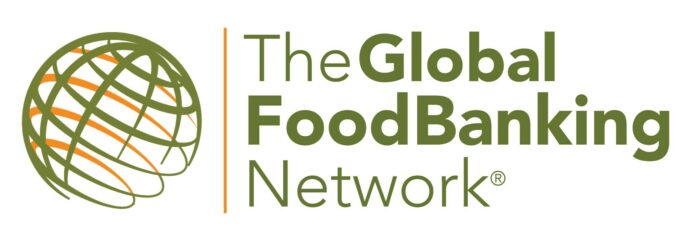
Tesco CEO announced as keynote speaker at 13th annual Food Bank Leadership Institute
LONDON, March 25, 2019 /PRNewswire/ — Food banks operating in 57 countries around the world mitigate an estimated 10.54 billion kg of CO2-eq annually – equivalent to nearly 2.2 million passenger vehicles, according to the Waste not, Want Not – Toward Zero Hunger: Food Banks – A Green Solution to Hunger study. This newly released study focuses on the contributions of local food bank organizations in achieving the United Nations’ Sustainable Development Goals.
The report, published by The Global FoodBanking Network (GFN), also found that the food bank networks of GFN, the European Food Banks Federation (FEBA) and Feeding America serve 62.5 million people and prevent approximately 2.68 million metric tons of safe, edible surplus food being wasted.
The study is released ahead of the Food Bank Leadership Institute (FBLI), a three-day conference in London on 25-27 March 2019, where Tesco CEO Dave Lewis will deliver the keynote address on food waste. The event, now in its 13th year, is an opportunity for food bank leaders to stay abreast of the latest trends and best practices in hunger relief, as well as accessing proven training and growth techniques.
GFN is also calling for food producers, retailers, and governments to adopt simplified label recommendations, as currently 20 percent1 of safe, edible food is wasted over confusion with “best by,” “best before,” “use by,” and “sell by” dates on packages.
These measures should help improve the current paradox, where one-third of all food produced for human consumption (1.3 billion tonnes)2 is being lost or wasted, whilst one in nine people (821 million)3 go hungry.
Lisa Moon, GFN President and CEO, said; “The ‘Waste Not, Want Not’ report highlights the large-scale environmental and social impact of food banks, a community-based model that is positioned to address both the paradox of global hunger and food waste during a time when hunger rates are regrettably on the rise. This community-based approach must be considered as a pivotal, stop gap solution in the fight against hunger, alongside public policy change that addresses the root causes of poverty.”
GFN is an international non-profit organization that creates and supports food banking organizations in 30 countries, which served more than 9 million people facing hunger last year. The organization and its partners play a vital role in redirecting surplus food to the hungry and reducing food insecurity in communities around the world.
Moon added; “Since its inception, the Food Bank Leadership Institute has supported community leaders from 60 countries to provide hunger relief through the recovery of wholesome, edible surpluses. Many are addressing emerging issues such as nutrition, rural hunger, and prepared food rescue while advocating for broader change in their communities.”
Ben Pearman, Northern Europe Managing Director, General Mills, added; “Food waste is a major social, environmental and economic challenge, one which General Mills has made our mission to tackle. The Food Bank Leadership Institute is a unique event that brings together leaders from across the globe to address these concerns.”
Dave Lewis, CEO, Tesco, said; “Globally more that 800 million people are going hungry whilst a third of all food never gets eaten. At Tesco, we’re committed to ensuring no good food goes to waste and we’re now donating over 300,000 meals of surplus food to over 7,000 charities and community groups each week working in partnership with FareShare. But we know there is more we can do – food banks play a crucial role in tackling global hunger and reducing food waste and today’s Food Bank Leadership Institute is a great opportunity for food banks, retailers and other involved stakeholders to come together to share their experiences so we can collectively learn and maximise our impact.”
FBLI, in cooperation with FEBA, is generously supported by Mission Partner, General Mills; Sustaining Partners, Brambles and H-E-B; and Supporting Partners, Bank of America Merrill Lynch, Cargill, The DLA Piper Foundation, Ingredion and PIMCO.
Research for Waste not, Want Not – Toward Zero Hunger: Food Banks – A Green Solution to Hunger was made possible by Bank of America Charitable Foundation and Cargill.
Download Waste not, Want Not – Toward Zero Hunger: Food Banks – A Green Solution to Hunger here.
About Food Bank Leadership Institute 2019
Date: Monday 25 March – Wednesday 27 March 2019
Time: Registration opens 7:30am each day, with talks beginning at 9:00am on Monday 25 March and Wednesday 27 March, and 8:30am on Tuesday 26 March.
Location: Millennium Gloucester Hotel, London
About The Global FoodBanking Network
The Global FoodBanking Network (GFN) is an international non-profit organization based in Chicago, USA, that nourishes the world’s hungry through launching and strengthening food banks in 30 countries. GFN focuses on combating hunger and preventing food waste by providing expertise, directing resources, sharing knowledge and developing connections that increase efficiency, ensure food safety and reach more people facing hunger. Last year, GFN member food banks rescued and redirected food to more than 9 million people facing hunger.
United Nations Sustainable Development Goals
The UN Sustainable Development Goals were announced in 2012 as a call for action by all countries – poor, rich and middle-income – to promote prosperity while protecting the planet. They recognize that ending poverty must go hand-in-hand with strategies that build economic growth and address a range of social needs including education, health, social protection, and job opportunities, while tackling climate change and environmental protection.
- GOAL 2.1 By 2030, end hunger and ensure access by all people, in particular the poor and people in vulnerable situations, including infants, to safe, nutritious and sufficient food all year round.
- GOAL 12.3 By 2030, halve per capita global food waste at the retail and consumer levels and reduce food losses along production and supply chains, including post-harvest losses.
1 Waste and Resources Action Programme, Consumer Insight: Date Labels and Storage Guidance (Banbury: WRAP, 2010).
2 FAO, Global Food Losses and Food Waste: Extent, Causes and Prevention (Rome: FAO, 2011).
3 FAO, IFAD, UNICEF, WFP, and WHO, The State of Food Security and Nutrition in the World 2018: Building Climate Resilience for Food Security and Nutrition (Rome: FAO, 2018).
SOURCE The Global FoodBanking Network



